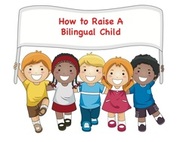Language - the gift that lasts a lifetime

Can my child learn another language that no one at home speaks?
Yes. Our program is designed to prepare students for school and develop language skills regardless of parent/home languages. Because our program includes 3-25 hours per week of the target language, students receive the support they need to develop and/or refine target language skills.
My child already attends an immersion school, how can your program help?
CGR Academy accepts students at different levels of the language learning process - beginner, intermediate and advanced. For those students with current immersion experience, our trained staff of Early Childhood Education specialists provides small group - homework and project support. Whether your student needs homework assistance, reading and writing support or additional vocabulary practice, CGR Academy classes are ideal for immersion students.
Our child has been attending a 45-85 minute weekly language class, why aren't they fluent?
To achieve proficiency language learning, like most complex skills, requires more than 45-85 minutes per week of practice. Those "play" classes are socializing opportunities. However, mastering the language requires several hours per week of additional exposure. A consistent, immersion program is the recommended solution for achieving fluency. Source: (Multilingual Children's Association)
I've looked at different foreign language classes for kids, they were all very expensive. Can I afford this program?
CGR Academy's mission is to develop 21st Century Citizens through language and cultural exchange. We provide second language learning for students, ages 2-12 years old. That's why our after-school, summer camp and Saturday care sessions all include FULL IMMERSION Spanish, French or Mandarin Chinese language classes at affordable prices. Students learn or receive support in a second language, without increasing parent's existing childcare and enrichment class budgets.
I'm concerned that my child is just learning English. Won't learning a second language confuse them?
Actually, studies have shown the opposite. Studies have proven that young children can acquire a second language as easily and naturally as they acquire their first. They've discovered cognitive advantages in learning a second language. Source: (ACTFL).
What standards is your program based on?
Our program curriculum and activities are based on the best practices provided by Common Core, the National Association for the Education of Young Children (NAEYC) and the American Council on the Teaching of Foreign Language (ACTFL). These organization provide standards that focus on the importance of immersion, self-directed play and encouraging children's natural curiosity.
What is TOTAL IMMERSION?
Total immersion is the method most people experience when learning their first/primary language. It is a dedicated time during which all activities (reading, writing, play, eating, etc.) are performed, while a single language is spoken. The important key is that no translations are involved. For example, if English is your first language - when it was time to eat, you were handed food and utensils, and told to eat. Through repetition, you learned the verb "eat" and the names for fork, spoon, chicken, plate, etc. This is the same nurturing and supportive process that CGR Academy students experience.
Yes. Our program is designed to prepare students for school and develop language skills regardless of parent/home languages. Because our program includes 3-25 hours per week of the target language, students receive the support they need to develop and/or refine target language skills.
My child already attends an immersion school, how can your program help?
CGR Academy accepts students at different levels of the language learning process - beginner, intermediate and advanced. For those students with current immersion experience, our trained staff of Early Childhood Education specialists provides small group - homework and project support. Whether your student needs homework assistance, reading and writing support or additional vocabulary practice, CGR Academy classes are ideal for immersion students.
Our child has been attending a 45-85 minute weekly language class, why aren't they fluent?
To achieve proficiency language learning, like most complex skills, requires more than 45-85 minutes per week of practice. Those "play" classes are socializing opportunities. However, mastering the language requires several hours per week of additional exposure. A consistent, immersion program is the recommended solution for achieving fluency. Source: (Multilingual Children's Association)
I've looked at different foreign language classes for kids, they were all very expensive. Can I afford this program?
CGR Academy's mission is to develop 21st Century Citizens through language and cultural exchange. We provide second language learning for students, ages 2-12 years old. That's why our after-school, summer camp and Saturday care sessions all include FULL IMMERSION Spanish, French or Mandarin Chinese language classes at affordable prices. Students learn or receive support in a second language, without increasing parent's existing childcare and enrichment class budgets.
I'm concerned that my child is just learning English. Won't learning a second language confuse them?
Actually, studies have shown the opposite. Studies have proven that young children can acquire a second language as easily and naturally as they acquire their first. They've discovered cognitive advantages in learning a second language. Source: (ACTFL).
What standards is your program based on?
Our program curriculum and activities are based on the best practices provided by Common Core, the National Association for the Education of Young Children (NAEYC) and the American Council on the Teaching of Foreign Language (ACTFL). These organization provide standards that focus on the importance of immersion, self-directed play and encouraging children's natural curiosity.
What is TOTAL IMMERSION?
Total immersion is the method most people experience when learning their first/primary language. It is a dedicated time during which all activities (reading, writing, play, eating, etc.) are performed, while a single language is spoken. The important key is that no translations are involved. For example, if English is your first language - when it was time to eat, you were handed food and utensils, and told to eat. Through repetition, you learned the verb "eat" and the names for fork, spoon, chicken, plate, etc. This is the same nurturing and supportive process that CGR Academy students experience.